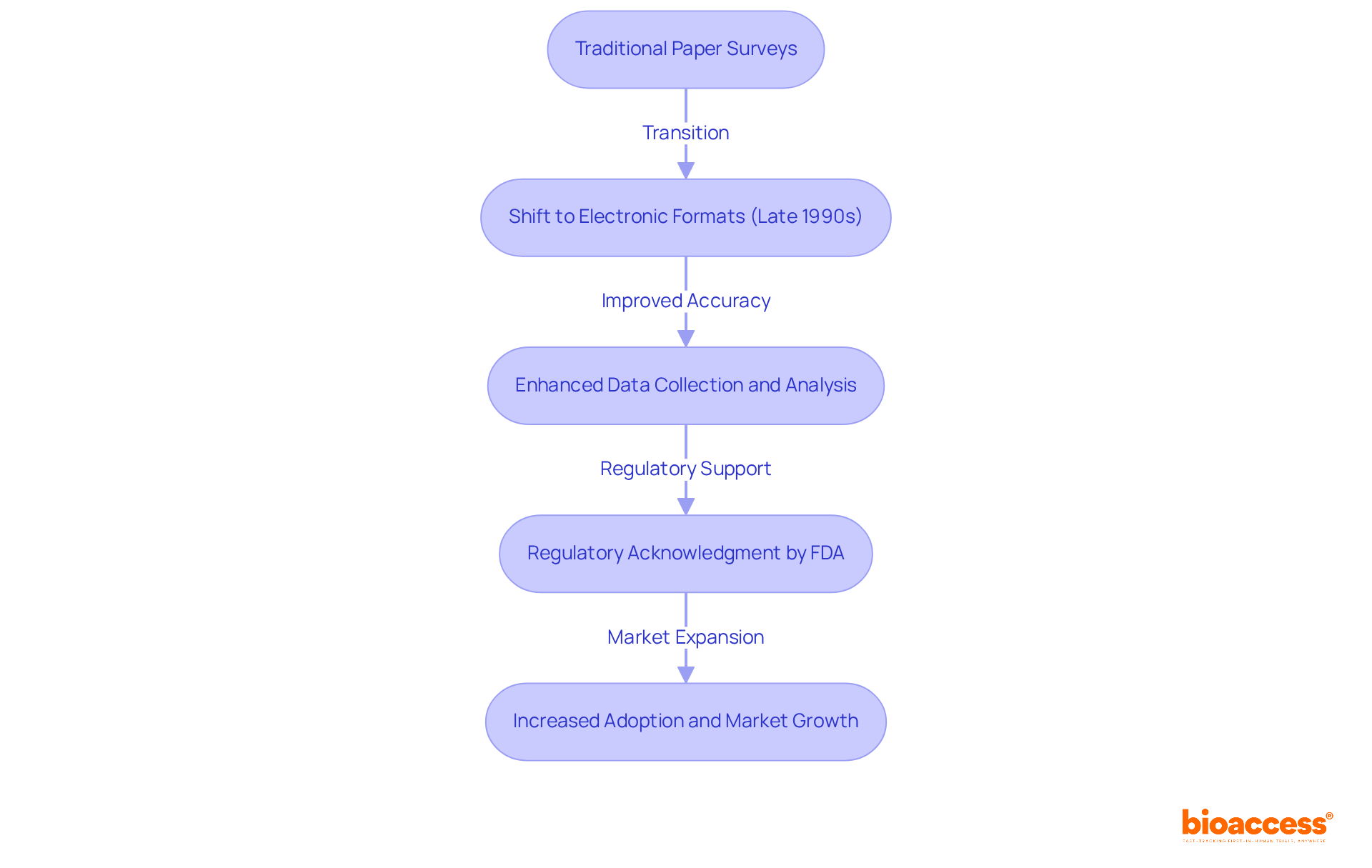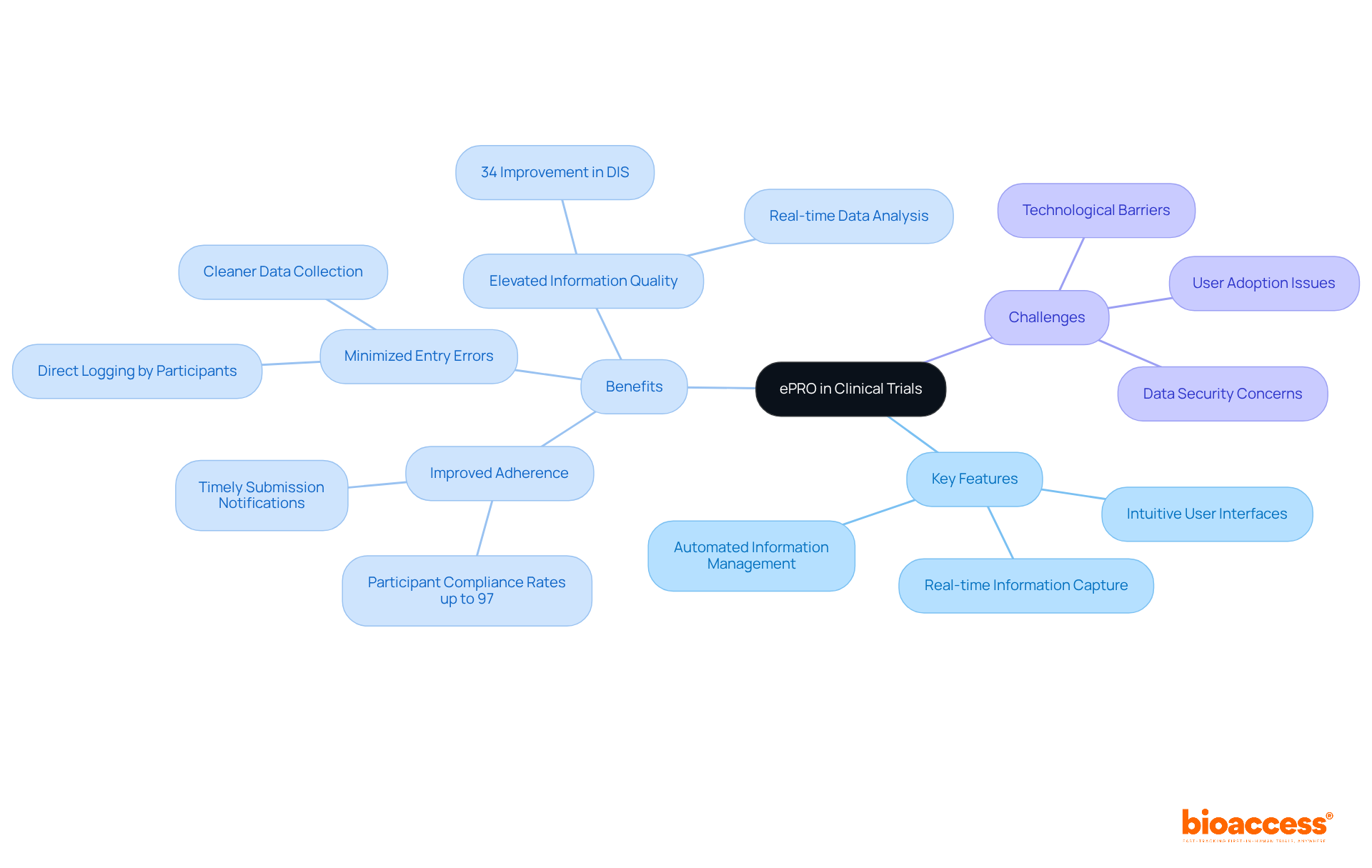


This article elucidates the definition and impact of electronic Patient-Reported Outcomes (ePRO) in clinical trials, underscoring their critical role in enhancing data collection and fostering patient engagement. ePRO systems significantly improve the accuracy and timeliness of health data by facilitating real-time reporting from participants. This advancement not only elevates the quality of information but also cultivates greater involvement and ownership among patients in managing their health. The relevance of ePRO in clinical research cannot be overstated, as it addresses key challenges in data accuracy and patient participation.
The emergence of Electronic Patient-Reported Outcomes (ePRO) has revolutionized the landscape of clinical trials, fundamentally transforming how health data is collected and analyzed. By enabling patients to report their health experiences in real-time through digital platforms, ePRO not only enhances data accuracy but also fosters deeper patient engagement.
However, as the integration of these systems becomes more widespread, significant questions arise regarding the challenges of technology adoption and data security.
These inquiries are crucial as we explore the evolving role of ePRO in clinical research.
Electronic Participant-Reported Outcomes represent a pivotal advancement in the collection of health data, gathered directly from individuals through electronic platforms such as mobile applications and online tools. This innovative approach empowers individuals to report their health status, symptoms, and treatment effects in real-time, significantly enhancing the accuracy and timeliness of data collection.
The integration of electronic patient-reported outcomes in ePRO clinical trials is increasingly prevalent, capturing individual experiences and results that traditional methods often overlook. For instance, recent research indicates that electronic patient-reported outcome systems considerably enhance individual involvement and results, particularly in oncology settings, where they facilitate improved monitoring of treatment impacts and side effects.
As we look ahead to 2025, the momentum towards the adoption of electronic patient-reported outcomes continues to grow, with numerous research studies recognizing their ability to elevate information quality. By centering on individual perspectives in evaluating treatment effectiveness and safety, electronic patient-reported outcomes not only bolster the reliability of collected data but also empower individuals by fostering greater engagement in their care.
Case studies illustrate that electronic Patient Reported Outcome tools, such as the Patient Care Monitor, lead to improved patient outcomes and reduced health resource utilization, underscoring the critical role these tools play in contemporary research. As the landscape of research trials evolves, the importance of the ePRO clinical trial in ensuring precise and comprehensive data collection cannot be overstated.

The concept of patient-reported outcomes (PRO) has been pivotal in medical research for decades. However, the shift to electronic formats began in the late 1990s, coinciding with the rise of digital technology. Initially, data collection relied heavily on paper surveys, which often led to entry errors and delayed analyses. As Patricio Ledesma aptly points out, "Traditional paper-based methods of collecting patient-reported outcomes (PRO) have proven to be inefficient and prone to errors."
The advent of electronic Patient-Reported Outcomes systems marked a significant transformation in ePRO clinical trials, facilitating real-time data collection and analysis, thereby enhancing the accuracy and efficiency of the trials. Regulatory bodies, including the FDA, have acknowledged the crucial role of electronic patient-reported outcomes in research, establishing guidelines that promote their integration into trial protocols. Notably, between 2010 and 2020, only 9 out of 108 FDA-approved oncology medications—merely 8.3%—incorporated electronic patient-reported outcomes in their labeling, underscoring the historical acceptance rate of such measures in research studies.
As mobile technology and information security protocols have advanced, the adoption of electronic patient-reported outcomes has surged, solidifying their status as a standard practice in contemporary clinical research. Case studies illustrate this evolution; for instance, the transition from traditional paper methods to electronic reporting systems has significantly reduced transcription errors and improved data integrity, while real-time monitoring features have enhanced safety and patient engagement.
Paul Edwards emphasizes that "electronic patient-reported outcome tools and technologies enhance data security, streamline data management and analysis processes, and reinforce patient-centric care." The ongoing development of electronic patient-reported outcome systems continues to shape the landscape of ePRO clinical trials, highlighting the importance of patient perspectives in achieving successful outcomes. Furthermore, the global electronic Clinical Outcome Assessments (eCOA) solutions market is projected to grow at a compound annual growth rate (CAGR) of 16.1% through 2030, underscoring the critical role of electronic patient-reported outcomes in the future of research.

The key characteristics of electronic patient-reported outcome systems include intuitive user interfaces, real-time information capture, and automated information management. These features significantly enhance ePRO clinical trials by improving participant adherence, minimizing entry errors, and elevating overall information quality.
For instance, electronic reporting systems can send notifications to individuals, prompting timely submission of results. This capability not only fosters adherence but also allows researchers to analyze information in real-time, facilitating swift decision-making that can accelerate the ePRO clinical trial process.
Moreover, the electronic patient-reported outcomes system empowers individuals to actively engage in their health documentation, leading to more comprehensive insights. Studies indicate that electronic patient-reported outcomes can achieve participant adherence rates of up to 97%, underscoring their effectiveness in enhancing information quality and regulatory compliance (Almac, 2013).
Case studies further demonstrate that the ePRO clinical trial electronic reporting technology reduces human errors in information entry, as responses are directly logged by participants, resulting in cleaner data collection and improved trial outcomes. For example, a study revealed a 34% enhancement in the Inconsistency Score (DIS) following the implementation of electronic Patient-Reported Outcomes, highlighting its impact on quality.
Nonetheless, it is crucial to consider challenges such as technological barriers, user adoption issues, and data security concerns when implementing electronic patient-reported outcome systems in trials.

The incorporation of electronic Participant-Reported Outcomes has significantly enhanced individual involvement in research studies, particularly in the collaborative efforts between bioaccess™ and Caribbean Health Group. By providing accessible digital tools for reporting results, this system empowers individuals to actively manage their health, fostering a sense of ownership over their health information.
This increased engagement correlates with improved retention rates in medical studies, with metrics indicating over a 50% reduction in recruitment time and retention rates reaching 95%. Furthermore, the quality of information obtained through electronic patient-reported outcomes often surpasses that of traditional methods, as individuals can share their experiences in real-time, minimizing recall bias and ensuring that the data accurately reflects their current health status.
Such advancements are crucial as bioaccess™ aims to position Barranquilla as a leading hub for research trials in Latin America, supported by initiatives from Colombia's Minister of Health. Therefore, the ePRO clinical trial not only bolsters the reliability of clinical trial data but also aligns research endeavors with patient needs and perspectives, ultimately contributing to the success of clinical trials in the region.

The exploration of electronic Patient-Reported Outcomes (ePRO) in clinical trials signifies a transformative shift in the collection and utilization of health data. By leveraging digital platforms, ePRO enhances the accuracy and timeliness of health reporting, enabling individuals to actively participate in their treatment journeys. This innovation captures valuable insights that traditional methods may overlook and fosters greater engagement and empowerment among patients.
Key points throughout the article highlight the evolution of ePRO from paper-based methods to sophisticated electronic systems, emphasizing significant improvements in data quality and participant adherence. The integration of ePRO has been shown to enhance the reliability of clinical trial data, reduce errors, and improve patient outcomes. Furthermore, the ongoing development of these technologies underscores their importance in future research, as evidenced by the projected growth in the electronic Clinical Outcome Assessments market.
Ultimately, the significance of ePRO extends beyond mere data collection; it aligns clinical trials with patient needs and perspectives, paving the way for more effective and patient-centric research. As the healthcare landscape continues to evolve, embracing electronic patient-reported outcomes will be crucial for advancing clinical research and improving health outcomes. Engaging with these innovative tools not only benefits researchers but also empowers patients, fostering a collaborative environment that prioritizes their health and well-being.
What are Electronic Patient-Reported Outcomes (ePRO)?
Electronic Patient-Reported Outcomes (ePRO) are health data collected directly from individuals through electronic platforms like mobile applications and online tools, allowing them to report their health status, symptoms, and treatment effects in real-time.
How do ePRO enhance data collection in clinical trials?
ePRO enhance data collection by improving the accuracy and timeliness of health data gathered, capturing individual experiences and results that traditional methods might overlook.
In which clinical settings are ePRO particularly beneficial?
ePRO are particularly beneficial in oncology settings, where they facilitate improved monitoring of treatment impacts and side effects.
What is the trend regarding the adoption of ePRO by 2025?
The trend indicates that the adoption of electronic patient-reported outcomes is expected to grow, with many research studies acknowledging their ability to elevate the quality of information collected.
How do ePRO contribute to patient engagement in their care?
ePRO empower individuals by fostering greater engagement in their care, as they center on individual perspectives in evaluating treatment effectiveness and safety.
What evidence supports the effectiveness of ePRO tools?
Case studies demonstrate that ePRO tools, such as the Patient Care Monitor, lead to improved patient outcomes and reduced health resource utilization.
Why are ePRO important in contemporary research trials?
ePRO are important in contemporary research trials because they ensure precise and comprehensive data collection, which is critical for evaluating treatment effectiveness and safety.